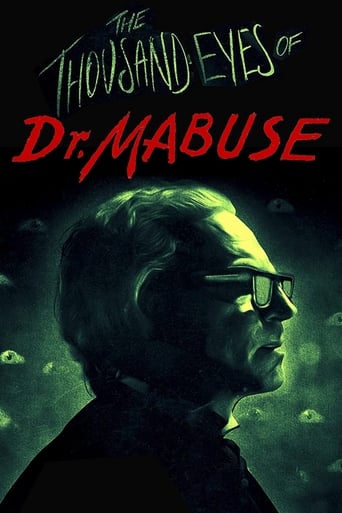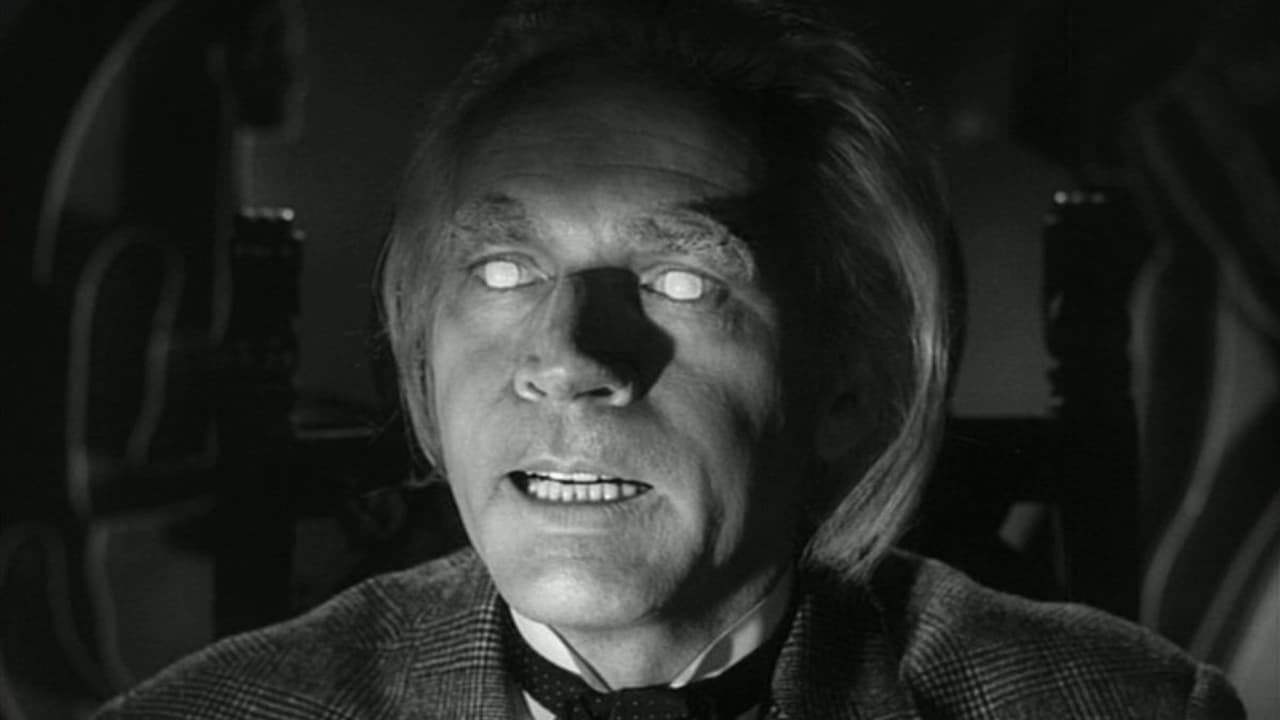Horst in Translation (filmreviews@web.de)
"Die 1000 Augen des Dr. Mabuse" or "The Thousand Eyes of Dr. Mabuse" is a 100-minute black-and-white film from Germany from 1960. And since the creation of Mabuse decades ago, there have been so many films about him (including some that are wrongly considered classics), and also many followed after 1960, even today. This one here has the advantage of the name Fritz Lang attached to it, the German silent film legend. But this one here is of course not a silent film anymore. For Lang, it was a bit of a return back to the roots with making another Mabuse movie and here we have one of his final works. The cast is decent with Peter van Eyck, Gert Fröbe ("Goldfinger", a personal favorite), Werner Peters and Wolfgang Preiss. It needed a better-written and acted character than Addams' though. Unfortunately, overall the script did not do too much for me. I have to say without mentioning Mabuse by name, this could have been a completely random film about another villain character. The significance attached to its name does not only come from saying the name all the time.It is not a failure by any means, but I thought with the cast Lang had he could have made a better film here. Maybe Thea von Harbou's creative touch was missing. Still the movie has a couple solid scenes that were tense and interesting to watch like the one outside the window for example, but overall it just felt like all the killing and drama was included to be shocking and mysterious, not as ingredients of a meal, of an edge-of-seat story that had me and other audiences captivated and genuinely caring about what will happen to the characters, who will live and who will die. Best thing about the film is clearly the acting, but even with how good it was, it was not enough to elevate the mediocre script to a level where I could recommend this movie. Thumbs down from me. Don't see it.
Dr Jacques COULARDEAU
It is interesting to discover or rediscover Fritz Lang. He was well known for one film, Metropolis, and then for a few American films, films he shot in the USA. But the full set of Dr Mabuse's films is fascinating in a way because it provides a rare vision on the German cinema from the early 1920s to 1960. The eye looking at the world from a German point of view that spans over Hitler, Nazism and the Second World War is Fritz Lang's. We know him for his highly symbolical Metropolis in which the meaning is built by visual and numerical symbols. In this Dr Mabuse it is different. There are quite a lot of symbols but inherited from the silent cinema of the old days, symbols that are there only to make clear a situation that had been depicted previously with pictures and no words, or a page of intertitles. Fritz Lang still uses that technique in his 1960 film, which is a long time overdue for a silent cinema technique. But that is a style, nothing but a way of speaking, not a meaning. The meaning is absolutely bizarre. Dr Mabuse is a highly criminal person but his objective is not to commit crimes in order to get richer or whatever. It is to control the world through his criminal activity. The world is seen as basically negative, leading to chaos and overexploitation, leading to anarchistic crime and nothing else because the only objective of this modern world is to make a profit by all means available. Dr Mabuse is a master mind of his time and for him crime is the only way to destroy that capitalistic world that he never calls capitalistic or Kapitalismus and to replace it with pure chaos that should be able to bring a regeneration, a rejuvenating epiphany, a re-founding experience. We find in his mind what we could find in some of the most important criminal minds in this world, like Carlos in France, or Charles Manson in the USA, or those sects that practice mass suicide in order to liberate the suicidees and to warn the world about the coming apocalypse. It is the mind and thinking of those who practice war as a revolutionary activity with a fundamentalist vision of their religions or politics and the world that is supposed to reflect that religion. They do not want to build a different society and when they are in power they are constantly aiming at antagonizing their own population and the world because they cannot exist if they do not feel some opposition that they can negate, bring down, crush, like in Iran, or in Germany with Hitler, though later on it was not much different under the Communists in East Germany. These visions need opposition to exist and they provoke that opposition by aiming at taking the control of the world with violence and imposing their control with more violence. That's Dr Mabuse, the main brain of a criminal decomposition and re-composition of society on an absolutely antagonistic vision of life. But that vision is very common. Just as common as this phrase "a half full glass is nothing but a half empty glass". Add antagonism to that dual vision and then you have a struggle to the death between the half empty glass that wants to be full and the half full glass that wants to be empty (or full?), one half only wanting to take what the other half has and impose his half to the other half to make the world one by the elimination of the other side of the coin. That dual antagonistic vision is the popular and shrivelled up approach of the communist catechism of Stalin, inherited from Marx's French son in law Paul Lafargue, or of course in all dictatorship that reduces life to a little red book, to one hundred quotations from the master thinker of the revolution. That's the world you feel in these films. Fritz Lang embodies this ideology of the mentally poor in that criminal character of his: kill, rob, steal, counterfeit. Even if you die when doing so, the world will change and remember. The master criminal has to die in his activity in order to regenerate the world. What Fritz Lang introduced in his double main feature of the early 1920s and in his Testament, is that the master brain of this vision internalizes this paranoid and psychotic vision of the world into himself and has to become psychotic himself and it is in his psychosis that he finds the energy to conquer the world again. In the third film, Dr Mabuse has been dead for a long time and is reincarnated by someone who finds his inspiration in the doctor. That is a far-fetched cinematographic and fictional antic that is necessary as a reference but brings nothing to the vision itself. A few years later that ideology was to conquer our imagination in many ways. First the Berlin Wall became the symbol of that vision the way it was carried and conveyed to the world by the East-German communists. Then we have to think of the various revolutionary movements like Der Baader Meinhof Komplex, Die Rote Armee Fraktion, to take some German examples. But think of the French Mesrine and the Italian revolutionary urban guerilla warfare movements and you will have a fair picture of this psychotic criminal mind copied and pasted into the political field. The Maoist Red Guard and Cultural Revolution movement was quite typical of this approach. All that was going to come in 1960 and we must admit Fritz Lang was seeing ahead of his time, just as he had seen Hitler in his Testament of Dr Mabuse: a political leader based on hypnosis and mesmerizing people into blindly following a band of criminals.Dr Jacques COULARDEAU, University Paris 1 Pantheon Sorbonne, University Paris 8 Saint Denis, University Paris 12 Créteil, CEGID
Vigilante-407
This is a great little whodunit and an excellent start to the revival of Fritz Lang's great Dr. Mabuse series. It is very reminiscent of the earlier films in the twenties and thirties, particularly Le Testament Du Dr. Mabuse, from which Lang lifts and modernizes many situations.I said don't read the credits in the title to this review because guessing who is actually the mastermind Mabuse is half of the fun...there are a lot of red herrings that don't play out until the last fifteen minutes of the movie.This was the first movie in the new Mabuse series and I would recommend anyone delving into the world of Dr. Mabuse use this as a starting point (especially if none of the silents or early talkies are available in your area).
Guy_T
You don't necessarily need to have seen Lang's earlier Mabuse films to be able to love this one. Like in his silent spy film 'Spione', Lang creates everything that would go on to be a genre cliche - but they all had to be original once. Here we have the stolen prototype weapon - a gun that fires needle shaped bullets that travel through glass and leave very little trace of assassination; and then there's the villain's car, with its revolving number-plates. Lang was certainly a few quick steps ahead of the makers of the Bond films, and certainly on a level with Hitchcock, Powell et al when it came to commenting on voyeurism.The plot's labyrinthine, of course, but it rattles along at such a pace and with such striking visuals that you hardly have time or the inclination to stop and worry - and it all comes clear at the end, with one or two fantastic revelations in addition to the few you expect.If one part doesn't quite please as much as you like, it's the context it fails to reference properly. Made at such a crucial time in History by a man who had seen so much, one only wishes it had more commentary to make. Lang's career swung like a pendulum between social commentary and serial escapades - if only he'd been able to pull the two together for his final film.


 AD
AD





